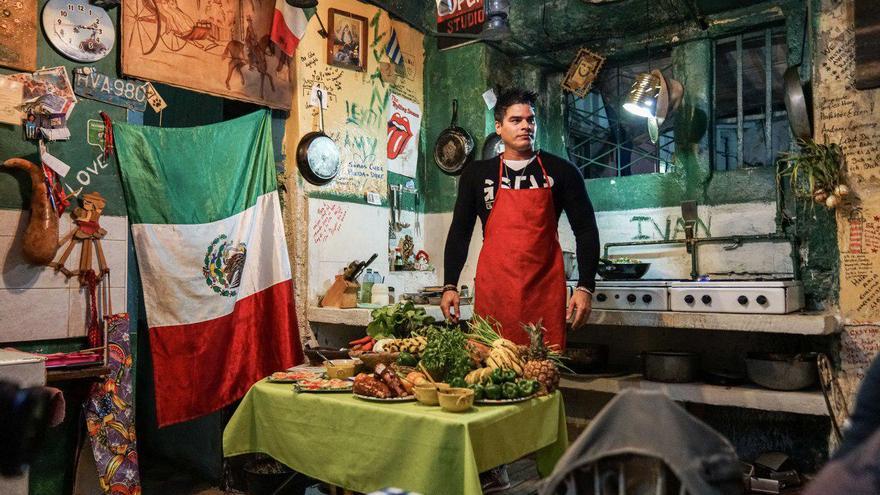
![]() 14ymedio, Luz Escobar, Havana, 21 March 2019 — The US announcement that it will replace the five-year B2 visa for Cubans with one of just three months has fallen like a bucket of cold water on the owners of small businesses that used to travel abroad to supply the Cuban private sector with all kinds of products, from Parmesan cheese and spices to soap for homes rented to tourists.
14ymedio, Luz Escobar, Havana, 21 March 2019 — The US announcement that it will replace the five-year B2 visa for Cubans with one of just three months has fallen like a bucket of cold water on the owners of small businesses that used to travel abroad to supply the Cuban private sector with all kinds of products, from Parmesan cheese and spices to soap for homes rented to tourists.
“I have a five-year visa that only has three months left before it expires and now I know I will not be able to obtain another one,” Lorenzo Pardo, 48, and manager of a home-based food store, explained to 14ymedio.
On March 18, the US government reduced the validity period of the B2 visa (tourism and family visits) for Cuban citizens from 5 years to three months. In addition, instead of a multiple entry visa the visa will be good for only one entry to the US. “I have been traveling up to four times a year to visit my family in Miami and also to bring back products,” he says.
Pardo loaded his suitcases with dried spices, especially garlic and onion, which often are not found on the island or have high prices. “I also brought disposable cutlery and other products that are very useful in my business of supplying food to homes,” he adds.
Despite the drawbacks, Pardo does not feel totally discouraged. “Now I will do the same but through Panama or Mexico,” he says. “The money that I used to leave in Miami will now be left in Cancun or in Panama City.”
The Panamanian authorities did not want to miss the opportunity and, just a few hours after the announcement from Washington, they announced their intention to increase the flexibility of their migration policy towards the island. As of last October Cubans could obtain a shopping permit, but now they will have access to a multiple entry visa for 5 years.
For Camilo Condis, also in the business of food services and accommodation for tourists, the new limitation transcends the issue of private businesses.
“Other than in 2016, when I brought home a computer, I have never brought imports, nor come home loaded with things for business,” he says. Condis believes that whoever wants to go shopping “has it easy in Panama” and prefers to focus on what he calls “the family cost.” As he laments, “My family is there and our ability to see each other regularly is in danger.”
Tamara Rodríguez feels the same pain. “It is true that I took advantage of the trips to Miami not only to visit my two children who live there, but also to bring basic products such as soap, shampoo and even bedding that has helped me a lot in this business,” says this self-employed person who operates several rooms for tourists in the coastal area of Guanabo, east of Havana. “Two years ago I got the Mexican visa and now I’m going to focus on getting the Panamanian one so this does not affect me too much,” she says in agreement.
Rodriguez says that many Cubans already suspected that something like this would happen. “In recent years steps have been reverse everything that was achieved with travel in the time of Barack Obama.” Three years ago she was staring at the television while it broadcast the speech of the American president at the Gran Teatro de La Habana.
“It seemed that only more advantages were coming, openings and a closer contact between both countries, but instead, what has happened is the opposite,” she laments. Rodríguez thinks that Cuban authorities should open more visas to Americans. “Maybe Donald Trump will reopen the five-year visa for us,” she says.
But the problems go beyond achieving a five-year multiple-entry visa. The United States has failed to comply with the migration agreement signed with Cuba in 1996 that guaranteed the delivery of 20,000 annual visas. It has also placed limitations on trips to the Island for US citizens. And, in addition, Cubans must now travel to third countries to apply for a visa.
Despite the denials of the Cuban government regarding its involvement in the events, most of the staff of the US embassy in Havana was removed from the island after the “sonic attacks” that affected more than twenty officials and their families.
“Now everything will become more complicated and it is likely that the consulates of Panama and Mexico will have a greater demand for visa applications,” reflects Wilfredo Pérez, another self-employed worker who still benefits from his five-year visa to visit his family in New Jersey. “I’m due to expire in 2021, so right now I do not have a big problem,” he explains to this newspaper.
Perez believes that the new situation may make some products more expensive in the “black market,” especially medicines, nutritional supplements, food and household appliances that arrived every week from the US to the island. Despite the inconveniences, he is optimistic. “People will adapt to the new situation and start to get more out of importing from other countries.”
________________
The 14ymedio team is committed to serious journalism that reflects the reality of deep Cuba. Thank you for joining us on this long road. We invite you to continue supporting us, but this time by becoming a member of 14ymedio. Together we can continue to transform journalism in Cuba.
